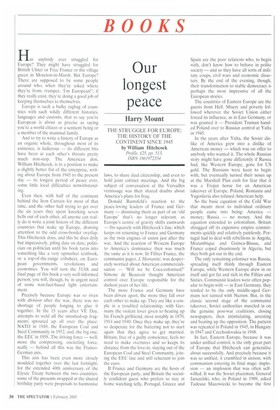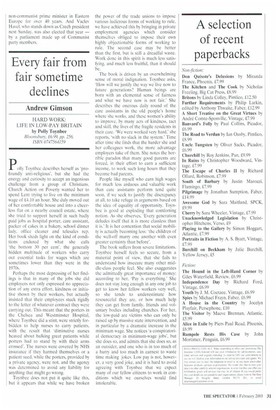Our longest peace
Harry Mount
THE STRUGGLE FOR EUROPE: THE HISTORY OF THE CONTINENT SINCE 1945 by William Hitchcock Profile, £25, pp. 513, ISBN 1861972334 Has anybody ever struggled for Europe? They might have struggled for British Ulster or Free France or the village green in Moreton-in-Marsh. But Europe? There are supposed to be some people around who, when they're asked where they're from, trumpet, 'I'm European'; if they really exist, they're doing a good job of keeping themselves to themselves.
Europe is such a bulky ragbag of countries with such wildly different histories, languages and customs, that to say you're European is about as precise as saying you're a world citizen or a sentient being or a member of the mammal family.
And to try to write a history of Europe as an organic whole, throughout most of its existence, is ludicrous — its different bits have been at each other's throats pretty much non-stop. The American don, William Hitchcock, is in a position to make a slightly better fist of the enterprise, writing about Europe from 1945 to the present day — its longest period of peace ever, some little local difficulties notwithstanding.
Even then, with half of the continent behind the Iron Curtain for most of that time, and the other half trying to get over the six years they spent knocking seven bells out of each other, all anyone can really do is write a joint history of the different countries that make up Europe, drawing attention to the odd cross-border overlap. This Hitchcock does, and this he does drily but impressively, piling date on date, politician on politician until his book turns into something like a very upmarket textbook, Or a top-of-the-range crihsheet, on European governments, revolutions and economies. You will turn the 513th and final page of this book a very well-informed person; you will, though, be in urgent need of some non-fact-based light entertainment.
Precisely because Europe was so riven with division after the war, there was no shortage of people longing to glue it together. In the 15 years after VE Day, attempts to weld all the smashed-up fragments sprouted up all over the place: NATO in 1949, the European Coal and Steel Community in 1952, and, the big one, the EEC in 1958. The driving force — well, more the compressing, encircling force, really — behind all this was the FrancoGerman axis.
This axis has been even more closely moulded together over the last fortnight, for the extended 40th anniversary of the Elysee Treaty between the two countries: some of the presents swapped at the shared birthday party were proposals to harmonise laws, to share dual citizenship, and even to hold joint cabinet meetings. And the big subject of conversation at the Versailles vernissage was their shared doubts about America's plans for Iraq.
Donald Rurnsfeld's reaction to the peace-loving leaders of France and Germany — dismissing them as part of an 'old Europe' that's no longer relevant, as Europe's centre of gravity shifts eastwards — fits squarely with Hitchcock's line, which keeps on returning to France and Germany as the twin engines of union just after the war. And the reaction of Western Europe to America's dominance then was much the same as it is now. In Fifties France, the communist paper, L'Humanite, was desperately worried about American commercialisation — 'Will we be Coca-colonised?' Simone de Beauvoir thought American control over Europe responsible for the darkest years of her life.
The more France and Germany have been driven apart, the more they fall over each other to make up. They are like a couple in a troubled relationship, with Germany the violent lover given to beating up his French girlfriend, most notably in 1870, 1914 and 1940. Once they make up, they're so desperate for the battering not to start again that they agree to get married. Britain, free of a guilty conscience, feels no need to make overtures and so keeps its distance from the love-in, staying out of the European Coal and Steel Community, joining the EEC late and still reluctant to join the euro.
If France and Germany are the hosts of the European party. and Britain the socially confident guest who prefers to stay at home watching telly, Portugal, Greece and Spain are the poor relations who, to begin with, don't know how to behave in polite society — and so they have all sorts of military coups, civil wars and economic disasters. By the end of the evening, though, their transformation to stable democracy is perhaps the most impressive of all the European stories.
The countries of Eastern Europe are the guests from Hell. Misery and poverty followed wherever the Soviet Union either forced its influence, as in East Germany, or was granted it — President Truman handed Poland over to Russian control at Yalta in 1945.
In the years after Yalta, the Soviet dislike of America grew into a dislike of American money — which was on offer to anybody who wanted it. The whole Russian story might have gone differently if Russia had, like Western Europe, gone for US gold. The Russians were keen to begin with, but eventually turned their noses up at the Marshall Plan cash for fear that it was a Trojan horse for an American takeover of Europe. Poland, Romania and Yugoslavia also refused American help.
So the basic equation of the Cold War that meant most to individual ordinary people came into being: America — money; Russia — no money. And the equation extended to colonialism. Britain shrugged off its expensive empire commitments quickly and relatively painlessly. Portugal had to deal with rebellions in Angola, Mozambique and Guinea-Bissau, and France coped disastrously in Algeria, but they both got out in the end.
The only remaining coloniser was Russia, spreading itself thinly through Eastern Europe, while Western Europe drew in on itself and got fat and rich in the Fifties and Sixties. Communist leaders were often popular to begin with — in East Germany, they tended to be the only middle-aged Germans not tainted with Nazism. But, in the classic second stage of the communist takeover, Soviet authorities muscled in on the genuine post-war coalitions, closing newspapers, then intimidating, arresting and beating up the opposition. The pattern was repeated in Poland in 1945, in Hungary in 1947 and Czechoslovakia in 1948.
In fact, Eastern Europe, because it was under unified control, is the only great part of Europe that Hitchcock can generalise about successfully. And precisely because it was so unified, it crumbled in unison, with communism entering its final stage: implo
sion an implosion that was often selfwilled. It was the Soviet placeman, General Jaruzelski, who. in Poland in 1989, asked Tadeusz Mazowiecki to become the first
non-communist prime minister in Eastern Europe for over 40 years. And Vacley Havel, who stands down as Czech president next Sunday. was also elected that year by a parliament made up of Communist party members.



























































 Previous page
Previous page